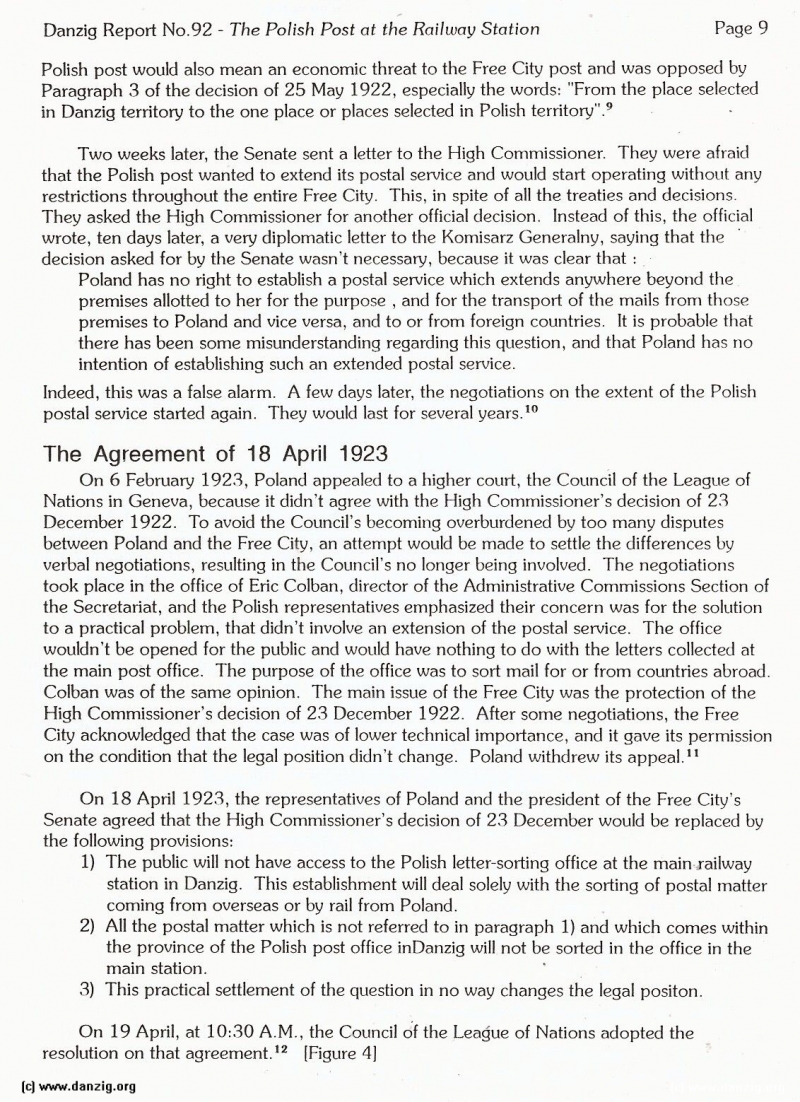
> The Polish Post office at the Railway Station in Danzig
Polish post would also mean an economic threat to the Free City post and was opposed by Paragraph 3 of the decision of 25 May 1922, especially the words: “From the place selected in Danzig territory to the one place or places selected in Polish territory”.
Two weeks later, the Senate sent a letter to the High Commissioner. They were afraid that the Polish post wanted to extend its postal service and would start operating without any restrictions throughout the entire Free City. This, in spite of all the treaties and decisions. They asked the High Commissioner for another official decision. Instead of this, the official wrote, ten days later, a very diplomatic letter to the Komisarz Generalny, saying that the decision asked for by the Senate wasn’t necessary, because it was clear that: Poland has no right to establish a postal service which extends anywhere beyond the premises allotted to her for the purpose , and for the transport of the mails from those premises to Poland and vice versa, and to or from foreign countries. It is probable that there has been some misunderstanding regarding this question, and that Poland has no intention of establishing such an extended postal service.
Indeed, this was a false alarm. A few days later, the negotiations on the extent of the Polish postal service started again. They would last for several years. 10
The Agreement of 18 April 1923
On 6 February 1923, Poland appealed to a higher court, the Council of the League of Nations in Geneva, because it didn’t agree with the High Commissioner’s decision of 23 December 1922. To avoid the Council’s becoming overburdened by too many disputes between Poland and the Free City, an attempt would be made to settle the differences by verbal negotiations, resulting in the Council’s no longer being involved. The negotiations took place in the office of Eric Colban, director of the Administrative Commissions Section of the Secretariat, and the Polish representatives emphasized their concern was for the solution to a practical problem, that didn’t involve an extension of the postal service. The office wouldn’t be opened for the public and would have nothing to do with the letters collected at the main post office. The purpose of the office was to sort mail for or from countries abroad. Colban was of the same opinion. The main issue of the Free City was the protection of the High Commissioner’s decision of 23 December 1922. After some negotiations, the Free City acknowledged that the case was of lower technical importance, and it gave its permission on the condition that the legal position didn’t change. Poland withdrew its appeal.
On 18 April 1923, the representatives of Poland and the president of the Free City’s Senate agreed that the High Commissioner’s decision of 23 December would be replaced by the following provisions:
1) The public will not have access to the Polish letter-sorting office at the main railway station in Danzig. This establishment will deal solely with the sorting of postal matter coming from overseas or by rail from Poland.
2) All the postal matter which is not referred to in paragraph 1) and which comes within the province of the Polish post office in Danzig will not be sorted in the office in the main station.
3) This practical settlement of the question in no way changes the legal positon.
On 19 April, at 10:30 A.M., the Council of the League of Nations adopted the resolution on that agreement. 12 [Figure 4]
Danzig Report Nr. 92 - July - August - September - 1996, Page 9.
Hits: 3799
Added: 14/07/2015
Copyright: 2025 Danzig.org

